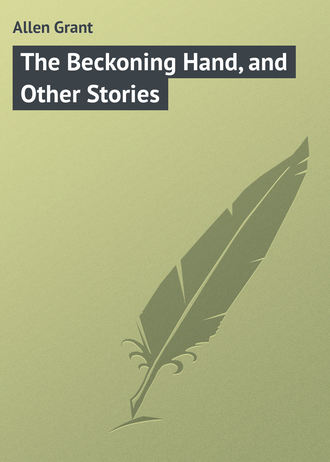 полная версия
полная версияThe Beckoning Hand, and Other Stories
Lemarchant laughed again, a quiet chuckle of conscious superiority, and only answered: "Behaving badly! Massacring white women! Lord bless your heart, I'd like to see them! Why, the wretched creatures wouldn't ever dare to do it. Oh, no, nothing of that sort, I can tell you. And our blood wasn't up either. We went in for it just by way of something to do, and to keep our hands in. Of course you can't allow a lot of lazy hulking blacks to go knocking around in the neighbourhood of an estate, stealing your fowls and fruit and so forth, without let or hindrance. It's the custom in Queensland to disperse the black fellows. I've often been out riding with a friend, and I've seen a nigger skulking about somewhere down in a hollow among the tree-ferns; and I've just drawn my six-shooter, and said to my friend, 'You see me disperse that confounded nigger!' and I've dispersed him right off – into little pieces, too, you may take your oath upon it."
"But do you mean to tell me, Mr. Lemarchant," Paterson said, looking a deal more puzzled and shocked, "that these poor creatures had been doing absolutely nothing?"
"Well, now, that's the way of all you home-sticking sentimentalists," Lemarchant went on, with an ugly simper. "You want to push on the outskirts of civilization and to see the world colonized, but you're too squeamish to listen to anything about the only practicable civilizing and colonizing agencies. It's the struggle for existence, don't you see: the plain outcome of all the best modern scientific theories. The black man has got to go to the wall; the white man, with his superior moral and intellectual nature, has got to push him there. At bottom, it's nothing more than civilization. Shoot 'em off at once, I say, and get rid of 'em forthwith and for ever."
"Why," I said, looking at him, with my disgust speaking in my face (Heaven forgive me!), "I call it nothing less than murder."
Lemarchant laughed, and lit his cigar; but after that, somehow, the other men didn't much care to talk to him in an ordinary way more than was necessary for the carrying out of the ship's business.
And yet he was a very gentlemanly fellow, I must admit, and well read and decently educated. Only there seemed to be a certain natural brutality about him, under a thin veneer of culture and good breeding, that repelled us all dreadfully from the moment we saw him. I dare say we shouldn't have noticed it so much if we hadn't been thrown together so closely as men are on an Arctic voyage, but then and there it was positively unendurable. We none of us held any communications with him whenever we could help it; and he soon saw that we all of us thoroughly disliked and distrusted him.
That only made him reckless and defiant. He knew he was bound to go the journey through with us now, and he set to work deliberately to shock and horrify us. Whether all the stories he told us by the ward-room fire in the evenings were true or not, I can't tell you – I don't believe they all were; but at any rate he made them seem as brutal and disgusting as the most loathsome details could possibly make them. He was always apologizing – nay, glorying – in bloodshed and slaughter, which he used to defend with a show of cultivated reasoning that made the naked brutality of his stories seem all the more awful and unpardonable at bottom. And yet one couldn't deny, all the time, that there was a grace of manner and a show of polite feeling about him which gave him a certain external pleasantness, in spite of everything. He was always boasting that women liked him; and I could easily understand how a great many women who saw him only with his company manners might even think him brave and handsome and very chivalrous.
I won't go into the details of the expedition. They will be found fully and officially narrated in the log, which I have hidden in the captain's box in the hut beside the captain's body. I need only mention here the circumstances immediately connected with the main matter of this confession.
One day, a little while before we got jammed into the ice off the Liakov Islands, Lemarchant was up on deck with me, helping me to remove from the net the creatures that we had dredged up in our shallow soundings. As he stooped to pick out a Leptocardium boreale, I happened to observe that a gold locket had fallen out of the front of his waistcoat, and showed a lock of hair on its exposed surface. Lemarchant noticed it too, and with an awkward laugh put it back hurriedly. "My little girl's keepsake!" he said in a tone that seemed to me disagreeably flippant about such a subject. "She gave it to me just before I set off on my way to Hammerfest."
I started in some astonishment. He had a little girl then – a sweetheart he meant, obviously. If so, Heaven help her! poor soul, Heaven help her! For any woman to be tied for life to such a creature as that was really quite too horrible. I didn't even like to think upon it.
I don't know what devil prompted me, for I seldom spoke to him, even when we were told off on duty together; but I said at last, after a moment's pause, "If you are engaged to be married, as I suppose you are from what you say, I wonder you could bear to come away on such a long business as this, when you couldn't get a word or a letter from the lady you're engaged to for a whole winter."
He went on picking out the shells and weeds as he answered in a careless, jaunty tone, "Why, to tell you the truth, Doctor, that was just about the very meaning of it. We're going to be married next summer, you see, and for reasons of her papa's – the deuce knows what! – my little girl couldn't possibly be allowed to marry one week sooner. There I'd been, knocking about and spooning with her violently for three months nearly; and the more I spooned, and the more tired I got of it, the more she expected me to go on spooning. Well, I'm not the sort of man to stand billing and cooing for a whole year together. At last the thing grew monotonous. I wanted to get an excuse to go off somewhere, where there was some sort of fun going on, till summer came, and we could get spliced properly (for she's got some tin, too, and I didn't want to throw her over); but I felt that if I'd got to keep on spooning and spooning for a whole winter, without intermission, the thing would really be one too many for me, and I should have to give it up from sheer weariness. So I heard of this precious expedition, which is just the sort of adventure I like; I wrote and volunteered for it; and then I managed to make my little girl and her dear papa believe that as I was an officer in the naval reserve I was compelled to go when asked, willy-nilly. 'It's only for half a year, you know, darling,' and all that sort of thing – you understand the line of country; and meanwhile I'm saved the bother of ever writing to her, or getting any letters from her either, which is almost in its way an equal nuisance."
"I see," said I shortly. "Not to put too fine a point upon it, you simply lied to her."
"Upon my soul," he answered, showing his teeth again, but this time by no means pleasantly, "you fellows on the Cotopaxi are really the sternest set of moralists I ever met with outside a book of sermons or a Surrey melodrama. You ought all to have been parsons, every man Jack of you; that's just about what you're fit for."
On the fourteenth of September we got jammed in the ice, and the Cotopaxi went to pieces. You will find in the captain's log how part of us walked across the pack to the Liakov Islands, and settled ourselves here on Point Sibiriakoff in winter quarters. As to what became of the other party, which went southwards to the mouth of the Lena, I know nothing.
It was a hard winter, but by the aid of our stores and an occasional walrus shot by one of the blue-jackets, we managed to get along till March without serious illness. Then, one day, after a spell of terrible frost and snow, the Captain came to me, and said, "Doctor, I wish you'd come and see Lemarchant, in the other hut here. I'm afraid he's got a bad fever."
I went to see him. So he had. A raging fever.
Fumbling about among his clothes to lay him down comfortably on the bearskin (for of course we had saved no bedding from the wreck), I happened to knock out once more the same locket that I had seen when he was emptying the drag-net. There was a photograph in it of a young lady. The seal-oil lamp didn't give very much light in the dark hut (it was still the long winter night on the Liakov Islands), but even so I couldn't help seeing and recognizing the young lady's features. Great Heaven support me! uphold me! I reeled with horror and amazement. It was Dora.
Yes; his little girl, that he spoke of so carelessly, that he lied to so easily, that he meant to marry so cruelly, was my Dora.
I had pitied the woman who was to be Harry Lemarchant's wife even when I didn't know who she was in any way; I pitied her terribly, with all my heart, when I knew that she was Dora – my own Dora. If I have become a murderer, after all, it was to save Dora – to save Dora from that unutterable, abominable ruffian.
I clutched the photograph in the locket eagerly, and held it up to the man's eyes. He opened them dreamily. "Is that the lady you are going to marry?" I asked him, with all the boiling indignation of that terrible discovery seething and burning in my very face.
He smiled, and took it all in in half a minute. "It is," he answered, in spite of the fever, with all his old dare-devil carelessness. "And now I recollect they told me the fellow she was engaged to was a doctor in London, and a brother of the parson. By Jove, I never thought of it before that your name, too, was actually Robinson. That's the worst of having such a deuced common name as yours; no one ever dreams of recognizing your relations. Hang it all, if you're the man, I suppose now, out of revenge, you'll be wanting next to go and poison me."
"You judge others by yourself, I'm afraid," I answered sternly. Oh, how the words seem to rise up in judgment against me at last, now the dreadful thing is all over!
I doctored him as well as I was able, hoping all the time in my inmost soul (for I will confess all now) that he would never recover. Already in wish I had become a murderer. It was too horrible to think that such a man as that should marry Dora. I had loved her once and I loved her still; I love her now; I shall always love her. Murderer as I am, I say it nevertheless, I shall always love her.
But at last, to my grief and disappointment, the man began to mend and get better. My doctoring had done him good; and the sailors, though even they did not love him, had shot him once or twice a small bird, of which we made fresh soup that seemed to revive him. Yes, yes, he was coming round; and my cursed medicines had done it all. He was getting well, and he would still go back to marry Dora.
The very idea put me into such a fever of terror and excitement that at last I began to exhibit the same symptoms as Lemarchant himself had done. The Captain saw I was sickening, and feared the fever might prove an epidemic. It wasn't: I knew that. Mine was brain, Lemarchant's was intermittent; but the Captain insisted upon disbelieving me. So he put me and Lemarchant into the same hut, and made all the others clear out, so as to turn it into a sort of temporary hospital.
Every night I put out from the medicine-chest two quinine powders apiece, for myself and Lemarchant.
One night, it was the 7th of April (I can't forget it), I woke feebly from my feverish sleep, and noticed in a faint sort of fashion that Lemarchant was moving about restlessly in the cabin.
"Lemarchant," I cried authoritatively (for as surgeon I was, of course, responsible for the health of the expedition), "go back and lie down upon your bearskin this minute! You're a great deal too weak to go getting anything for yourself as yet. Go back this minute, sir, and if you want anything, I'll pull the string, and Paterson'll come and see what you're after." For we had fixed up a string between the two huts, tied to a box at the end, as a rough means of communication.
"All right, old fellow," he answered, more cordially than I had ever yet heard him speak to me. "It's all square, I assure you. I was only seeing whether you were quite warm and comfortable on your rug there."
"Perhaps," I thought, "the care I've taken of him has made him really feel a little grateful to me." So I dozed off and thought nothing more at the moment about it.
Presently, I heard a noise again, and woke up quietly, without starting, but just opened my eyes and peered about as well as the dim light of the little oil-lamp would allow me.
To my great surprise, I could make out somehow that Lemarchant was meddling with the bottles in the medicine-chest.
"Perhaps," thought I again, "he wants another dose of quinine. Anyhow, I'm too tired and sleepy to ask him anything just now about it."
I knew he hated me, and I knew he was unscrupulous, but it didn't occur to me to think he would poison the man who had just helped him through a dangerous fever.
At four I woke, as I always did, and proceeded to take one of my powders. Curiously enough, before I tasted it, the grain appeared to me to be rather coarser and more granular than the quinine I had originally put there. I took a pinch between my finger and thumb, and placed it on my tongue by way of testing it. Instead of being bitter, the powder, I found, was insipid and almost tasteless.
Could I possibly in my fever and delirium (though I had not consciously been delirious) have put some other powder instead of the quinine into the two papers? The bare idea made me tremble with horror. If so, I might have poisoned Lemarchant, who had taken one of his powders already, and was now sleeping quietly upon his bearskin. At least, I thought so.
Glancing accidentally to his place that moment, I was vaguely conscious that he was not really sleeping, but lying with his eyes held half open, gazing at me cautiously and furtively through his closed eyelids.
Then the horrid truth flashed suddenly across me. Lemarchant was trying to poison me.
Yes, he had always hated me; and now that he knew I was Dora's discarded lover, he hated me worse than ever. He had got up and taken a bottle from the medicine-chest, I felt certain, and put something else instead of my quinine inside my paper.
I knew his eyes were fixed upon me then, and for the moment I dissembled. I turned round and pretended to swallow the contents of the packet, and then lay down upon my rug as if nothing unusual had happened. The fever was burning me fiercely, but I lay awake, kept up by the excitement, till I saw that he was really asleep, and then I once more undid the paper.
Looking at it closely by the light of the lamp, I saw a finer powder sticking closely to the folded edges. I wetted my finger, put it down and tasted it. Yes, that was quite bitter. That was quinine, not a doubt about it.
I saw at once what Lemarchant had done. He had emptied out the quinine and replaced it by some other white powder, probably arsenic. But a little of the quinine still adhered to the folds in the paper, because he had been obliged to substitute it hurriedly; and that at once proved that it was no mistake of my own, but that Lemarchant had really made the deliberate attempt to poison me.
This is a confession, and a confession only, so I shall make no effort in any way to exculpate myself for the horrid crime I committed the next moment. True, I was wild with fever and delirium; I was maddened with the thought that this wretched man would marry Dora; I was horrified at the idea of sleeping in the same room with him any longer. But still, I acknowledge it now, face to face with a lonely death upon this frozen island, it was murder – wilful murder. I meant to poison him, and I did it.
"He has set this powder for me, the villain," I said to myself, "and now I shall make him take it without knowing it. How do I know that it's arsenic or anything else to do him any harm? His blood be upon his own head, for aught I know about it. What I put there was simply quinine. If anybody has changed it, he has changed it himself. The pit that he dug for another, he himself shall fall therein."
I wouldn't even test it, for fear I should find it was arsenic, and be unable to give it to him innocently and harmlessly.
I rose up and went over to Lemarchant's side. Horror of horrors, he was sleeping soundly! Yes, the man had tried to poison me; and when he thought he had seen me swallow his poisonous powder, so callous and hardened was his nature that he didn't even lie awake to watch the effect of it. He had dropped off soundly, as if nothing had happened, and was sleeping now, to all appearance, the sleep of innocence. Being convalescent, in fact, and therefore in need of rest, he slept with unusual soundness.
I laid the altered powder quietly by his pillow, took away his that I had laid out in readiness for him, and crept back to my own place noiselessly. There I lay awake, hot and feverish, wondering to myself hour after hour when he would ever wake and take it.
At last he woke, and looked over towards me with unusual interest. "Hullo, Doctor," he said quite genially, "how are you this morning, eh? getting on well, I hope." It was the first time during all my illness that he had ever inquired after me.
I lied to him deliberately to keep the delusion up. "I have a terrible grinding pain in my chest," I said, pretending to writhe. I had sunk to his level, it seems. I was a liar and a murderer.
He looked quite gay over it, and laughed. "It's nothing," he said, grinning horribly. "It's a good symptom. I felt just like that myself, my dear fellow, when I was beginning to recover."
Then I knew he had tried to poison me, and I felt no remorse for my terrible action. It was a good deed to prevent such a man as that from ever carrying away Dora – my Dora – into a horrid slavery. Sooner than that he should marry Dora, I would poison him – I would poison him a thousand times over.
He sat up, took the spoon full of treacle, and poured the powder as usual into the very middle of it. I watched him take it off at a single gulp without perceiving the difference, and then I sank back exhausted upon my roll of sealskins.
All that day I was very ill; and Lemarchant, lying tossing beside me, groaned and moaned in a fearful fashion. At last the truth seemed to dawn upon him gradually, and he cried aloud to me: "Doctor, Doctor, quick, for Heaven's sake! you must get me out an antidote. The powders must have got mixed up somehow, and you've given me arsenic instead of quinine, I'm certain."
"Not a bit of it, Lemarchant," I said, with some devilish malice; "I've given you one of my own packets, that was lying here beside my pillow."
He turned as white as a sheet the moment he heard that, and gasped out horribly, "That – that – why, that was arsenic!" But he never explained in a single word how he knew it, or where it came from. I knew. I needed no explanation, and I wanted no lies, so I didn't question him.
I treated him as well as I could for arsenic poisoning, without saying a word to the captain and the other men about it; for if he died, I said, it would be by his own act, and if my skill could still avail, he should have the benefit of it; but the poison had had full time to work before I gave him the antidote, and he died by seven o'clock that night in fearful agonies.
Then I knew that I was really a murderer.
My fingers are beginning to get horribly numb, and I'm afraid I shan't be able to write much longer. I must be quick about it, if I want to finish this confession.
After that came my retribution. I have been punished for it, and punished terribly.
As soon as they all heard Lemarchant was dead – a severe relapse, I called it – they set to work to carry him out and lay him somewhere. Then for the first time the idea flashed across my mind that they couldn't possibly bury him. The ice was too deep everywhere, and underneath it lay the solid rock of the bare granite islands. There was no snow even, for the wind swept it away as it fell, and we couldn't so much as decently cover him. There was nothing for it but to lay him out upon the icy surface.
So we carried the stark frozen body, with its hideous staring eyes wide open, out by the jutting point of rock behind the hut, and there we placed it, dressed and upright. We stood it up against the point exactly as if it were alive, and by-and-by the snow came and froze it to the rock; and there it stands to this moment, glaring for ever fiercely upon me.
Whenever I went in or out of the hut, for three long months, that hideous thing stood there staring me in the face with mute indignation. At night, when I tried to sleep, the murdered man stood there still in the darkness beside me. O God! I dared not say a word to anybody: but I trembled every time I passed it, and I knew what it was to be a murderer.
In May, the sun came back again, but still no open water for our one boat. In June, we had the long day, but no open water. The captain began to get impatient and despondent, as you will read in the log: he was afraid now we might never get a chance of making the mouth of the Lena.
By-and-by, the scurvy came (I have no time now for details, my hands are so cramped with cold), and then we began to run short of provisions. Soon I had them all down upon my hands, and presently we had to place Paterson's corpse beside Lemarchant's on the little headland. Then they sank, one after another – sank of cold and hunger, as you will read in the log – till I alone, who wanted least to live, was the last left living.
I was left alone with those nine corpses propped up awfully against the naked rock, and one of the nine the man I had murdered.
May Heaven forgive me for that terrible crime; and for pity's sake, whoever you may be, keep it from Dora – keep it from Dora!
My brother's address is in my pocket-book.
The fever and remorse alone have given me strength to hold the pen. My hands are quite numbed now. I can write no longer.
There the manuscript ended. Heaven knows what effect it may have upon all of you, who read it quietly at home in your own easy-chairs in England; but we of the search party, who took those almost illegible sheets of shaky writing from the cold fingers of the one solitary corpse within the frozen cabin on the Liakov Islands – we read them through with such a mingled thrill of awe and horror and sympathy and pity as no one can fully understand who has not been upon an Arctic expedition. And when we gathered our sad burdens up to take them off for burial at home, the corpse to which we gave the most reverent attention was certainly that of the self-accused murderer.
HARRY'S INHERITANCE
I
Colonel Sir Thomas Woolrych, K.C.B. (retired list), was a soldier of the old school, much attached to pipe-clay and purchase, and with a low opinion of competitive examinations, the first six books of Euclid, the local military centres, the territorial titles of regiments, the latest regulation pattern in half-dress buttons, and most other confounded new-fangled radical fal-lal and trumpery in general. Sir Thomas believed as firmly in the wisdom of our ancestors as he distrusted the wisdom of our nearest descendants, now just attaining to years of maturity and indiscretion. Especially had he a marked dislike for this nasty modern shopkeeping habit of leaving all your loose money lying idly at your banker's, and paying everybody with a dirty little bit of crumpled paper, instead of pulling out a handful of gold, magnificently, from your trousers pocket, and flinging the sovereigns boldly down before you upon the counter like an officer and a gentleman. Why should you let one of those bloated, overfed, lazy banker-fellows grow rich out of borrowing your money from you for nothing, without so much as a thank-you, and lending it out again to some other poor devil of a tradesman (probably in difficulties) at seven per cent. on short discount? No, no; that was not the way Sir Thomas Woolrych had been accustomed to live when he was an ensign (sub-lieutenant they positively call it nowadays) at Ahmednuggur, in the North-West Provinces. In those days, my dear sir, a man drew his monthly screw by pay-warrant, took the rupees in solid cash, locked them up carefully in the desk in his bungalow, helped himself liberally to them while they lasted, and gave IOU's for any little trifle of cards or horses he might happen to have let himself in for meanwhile with his brother-officers. IOU's are of course a gentlemanly and recognized form of monetary engagement, but for bankers' cheques Sir Thomas positively felt little less than contempt and loathing.









